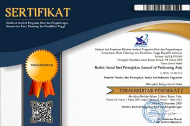Investigating the Indonesia Folk Song Arrangement in Six Choir Competition, 2019
Abstract
This study is aimed at investigating the trend of folk song arrangement in six Choir Competitions Folklore Category, 2019. It is specifically focused on investigating three things: the trend of arrangers’ names, title of, origin of folk songs performed in the competitions, the characteristic of the arrangement and relationship between the arrangers and the national choir competitions committee. The reason of choosing the topic is because such a folk song arrangement is seen to be one of the key factors in conducting a choir competition, folklore category. As for the research method, it is more on music behaviour in a relational teritory. Therefore, it used a document study and qualitative research design. In this case, the researcher observed in six choir competitions and interviewed the arrangers, choir leaders, and musicians taking apart in the competitions. The findings revealed that the most frequently used arrangement was Ken Steven’s “Cikala Le Pong Pong”, the most popular arranger was Budi Susanto Yohanes, and Java and Madura were the two origins from which most of the folk songs were performed in choir competitions. The characteristic of the most popular one due to its unique arrangement in the form of vibrant music rhythm and body percussion. It revealed that an arranger is the first key agent in a systemic social-organization mechanism like in a choir competition.
Keywords
Full Text:
PDFReferences
Journal Article
Artanto, M. (2016). Mencermati Transit dan Transition dalam Aransemen Musik Nyanyian Negeriku Karya Singgih Sanjaya. Kajian Seni, 2(2), 132–150. https://doi.org/https://doi.org/10.22146/jksks.12141
Dwi Arini, S. H., Supriadi, D., & -, S. (2015). Karakter Musik Etnik Dan Representasi Identitas Musik Etnik. Panggung, 25(2), 177–188. https://doi.org/10.26742/panggung.v25i2.7
Firmansyah, Simatupang, G. R. L. L., Kusmayati, H., & Sushartami, W. (2019). Aksiologi Musikal pada Pertunjukan Tari Tradisional Linda dalam Ritual Adat Keagamaan Karia di Daerah Kabupaten Muna Provinsi Sulawesi Tenggara. Resital, 20(3), 132–149. https://doi.org/10.24821/resital.v20i3.3817
Ganap, V. (2012). Konsep Multikultural dan Etnisitas Pribumi dalam Penelitian Seni. Humaniora, 24(2), 156–167. https://doi.org/https://doi.org/10.22146/jh.v24i2.1058
Lapian, Alrik and Mulyana, A. R. (2017). Musik Vocal Etnik Minahasa Budaya Tradisi. Dewaruci, 12(2), 71–78. https://doi.org/DOI: https://doi.org/10.33153/dewaruci.v12i2.2529
Martarosa, M. (2017). Musik Bandar Dalam Perspektif Seni Budaya Nusantara. Resital: Jurnal Seni Pertunjukan, 18(1), 27–42. https://doi.org/10.24821/resital.v18i1.2444
Omega, E., Simatupang, G. R. L. L., & Koapaha, R. B. (2019). Penyajian Lagu Dewa Ayu Janger oleh Immanuel Choir. Kajian Seni, 06(01), 68–80. https://doi.org/https://doi.org/10.22146/jksks.51704
Purnomo, W. (2018). A Hingga K Tahap Dasar Mengaransemen Nyanyian Untuk Paduan Suara. LAKON, Jurnal Pengkajian & Penciptaan Wayang, XV(1), 56–68.
Ronaldi and Sukerta, P. M. (2013). “ Bansi Rang Solok ” Music Composition Of ( Re Interpretasi Tradisi ). Dewaruci, 12(1), 17–21. https://doi.org/https://doi.org/10.33153/dewaruci.v12i1.2516
Rustim, Nugraha Ch.R., W., & Simatupang, G. R. L. L. (2019). Interaksi Sosial Tradisi Bagurau Saluang Dendang Minangkabau di Sumatera Barat. Resital: Jurnal Seni Pertunjukan, 20(1), 36–51. https://doi.org/10.24821/resital.v20i1.3509
Rustiyanti, S. (2017). Aluang Bunian Karawitan Minangkabau dalam Pamenan Anak Nagari dari Penyajian Bagurau ke Presentasi Estetik. Resital: Jurnal Seni Pertunjukan, 16(2), 104–115. https://doi.org/10.24821/resital.v16i2.1510
Sanjaya, R. M. S. (2013). Metode Lima Langkah Aransemen Musik. Promusika, 1(1), 33–49. https://doi.org/10.24821/promusika.v0i0.538
Santosa. (2015). Pusat Sumber Musik Dunia Di ISI Surakarta : Peran, Masalah dan Kebijakan. Dewaruci, 10(1), 22–28. https://doi.org/10.33153/dewaruci.v10i1.2142
Satriana, R., Haryono, T., & Hastanto, S. (2014). Kanca Indihiang sebagai Embrio Kreativitas Mang Koko. Resital: Jurnal Seni Pertunjukan, 15(1), 32–42. https://doi.org/10.24821/resital.v15i1.798
Syafputra, Y., Penciptaan, P., & Musik, S. (2017). Pengalaman Empiris Menjadi Sebuah Ide dalam Penciptaan Musik. Dewaruci, 12(1 Juli), 31–39. https://doi.org/10.33153/dewaruci.v12i1.2518
Takari, M. (2005). Kesenian di Sumatera Utara: Beberapa Pemikiran Mengenai Arah dan Pengembangan Fungsinya. https://www.etnomusikologiusu.com/jurnal-etnomusikologi-dan-hoho.html
Tindaon, R., Simatupang, G. R. L. L., & Ganap, V. (2018). Andung-Andung Mate di Ranto. Resital, 19(1), 46–53. https://doi.org/https://doi.org/10.24821/resital.v19i1.2451
Zulkarnain Mistortoify, Timbul Haryono, L. L. S. dan V. G. (2010). Kejhungan: Gaya Nyanyian Madura dalam Pemaknaan Masyarakat Madura Barat pada Penyelenggaraan Tradisi Remoh. Resital: Jurnal Seni Pertunjukan, 11(1 Juni), 1–14. https://doi.org/10.16309/j.cnki.issn.1007-1776.2003.03.004
Book
Boyd, M. (2002). Arrangement. In S. Sadie (Ed.), The New Grove Dictionary of Music and Musican (4th ed.). London: Macmillan Publisher Ltd.
Dasilva, F. A. B. D. D. (1984). The Sociology of Music. Notre Dame: University of Notre Dame Press.
Machlis, J. (1977). The Enjoyment of Music (4th ed.). New York: W.W. Norton & Company.
Ostrander, A. E. . D. W. (1986). Contemporary Choral Arranging. New Jersey: Prentice-Hall.
Simatupang, G. R. L. L. (2013). Pergelaran : Sebuah Mozaik Penelitian Seni-Budaya. Yogyakarta: Jalasutra.
Small, C. (1998). Musicking: The Meaning of Performing and Listening (pp. 1–230). Connecticit: Wesleyan University Press.
Sunardi, S. (2012). Vodka dan Birahi Seorang Nabi. Yogyakarta: Jalasutra.
Titon, J. T. (1992). Music, Folk, and Tradition. In R. Bauman (Ed.), Folklore, Cultural Performance, and Popular Entertainment (pp. 167–171). Oxford: Oxford University Press.
Yampolsky, P. (2002). Indonesia. In The New Grove Dictionary of Music and Musican (Volume 4, pp. 275–371). London: Macmillan Publisher Ltd.
DOI: https://doi.org/10.24821/resital.v21i2.4357
Refbacks
- There are currently no refbacks.
This work is licensed under a Creative Commons Attribution 4.0 International License.



